
JOURNAL OF POLYMER RESEARCH
Scope & Guideline
Connecting Researchers with the Latest in Polymer Advancements
Introduction
Aims and Scopes
- Polymer Synthesis and Characterization:
The journal publishes research on various synthetic methods for polymers, including traditional and novel techniques such as RAFT, ATRP, and click chemistry, as well as characterization techniques that elucidate polymer structure and properties. - Biodegradable and Bio-based Polymers:
There is a strong emphasis on the development of environmentally friendly materials, such as biodegradable polymers and bio-based composites, addressing the need for sustainability in polymer applications. - Nanocomposites and Hybrid Materials:
Research on nanocomposites, which enhance the properties of polymers through the incorporation of nanoparticles, is a key focus area. The journal explores how these materials can improve mechanical, thermal, and electrical properties. - Functional Polymers and Smart Materials:
The journal highlights advancements in functional polymers that respond to external stimuli (like pH, temperature, or light) and their applications in fields such as drug delivery, sensors, and actuators. - Polymer Processing and Engineering:
Research on the processing techniques for polymers, such as electrospinning, 3D printing, and injection molding, is also a significant area of interest, investigating how processing affects material properties. - Polymer Applications in Medicine and Environmental Science:
The journal features studies on the application of polymers in biomedical fields, such as drug delivery systems and tissue engineering, as well as their use in environmental remediation and sustainable practices.
Trending and Emerging
- Sustainable and Eco-friendly Polymers:
There is a significant increase in research dedicated to sustainable and eco-friendly polymers, including biodegradable plastics and materials derived from renewable resources, driven by global environmental concerns. - Smart and Functional Polymers:
Emerging themes include the development of smart polymers that respond to environmental stimuli, which are increasingly being applied in drug delivery systems, sensors, and adaptive materials. - Advanced Nanocomposite Materials:
The trend towards the use of nanocomposites for enhancing the properties of polymers is growing, with a focus on integrating novel nanomaterials to achieve superior mechanical, thermal, and electrical characteristics. - Polymer Applications in Biomedicine:
Research on the application of polymers in biomedical fields, particularly in drug delivery and tissue engineering, is rapidly increasing, reflecting the advancement of polymer science in addressing health-related challenges. - Polymer Recycling and Upcycling:
An emerging focus on the recycling and upcycling of polymers, including the development of methods to reprocess and reuse polymer waste, is gaining traction as sustainability becomes a key concern in material science.
Declining or Waning
- Conventional Polymer Processing Techniques:
There seems to be a declining focus on traditional processing techniques, such as extrusion and casting, as researchers increasingly explore more innovative and efficient methods like 3D printing and electrospinning. - Basic Polymer Chemistry:
Research that solely focuses on fundamental polymer chemistry without application or advanced characterization appears to be diminishing, as there is a stronger inclination towards applied research with immediate relevance to technology and sustainability. - Non-biodegradable Polymer Studies:
There is a noticeable decrease in publications centered on non-biodegradable polymers, as the field shifts towards the exploration of sustainable materials and biodegradable alternatives. - Single-Function Polymers:
Research on polymers with single functionalities is waning as the interest grows in multifunctional materials that offer combined properties for enhanced performance in various applications.
Similar Journals
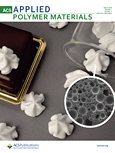
ACS Applied Polymer Materials
Pioneering Insights in Applied Polymer MaterialsACS Applied Polymer Materials is a prestigious journal published by the American Chemical Society, specifically tailored for the dynamic fields of Organic Chemistry, Polymers and Plastics, and Process Chemistry and Technology. With its ISSN 2637-6105, the journal has rapidly established itself within the academic community, achieving a distinguished Q1 quartile ranking across multiple categories in 2023. This places it among the top-tier journals globally, reinforcing its critical role in disseminating groundbreaking research and innovation in polymer science. The journal is known for its rigorous peer-review process and publishes high-quality articles that are pivotal for researchers, professionals, and students eager to advance knowledge in polymer materials and their applications. Positioned to cover converging themes from 2019 through 2024, ACS Applied Polymer Materials embraces a wide scope of studies, from fundamental chemistry to practical engineering applications, thereby fostering significant advancements in material science. While it offers traditional access options, the journal's impact is reflected in its impressive rankings within Scopus, indicating its relevance and influence in the chemical engineering domain. Join the global community of innovators and discover the latest insights that continue to shape the landscape of applied polymer research.
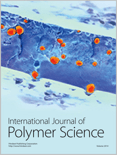
International Journal of Polymer Science
Exploring New Frontiers in Polymer ApplicationsInternational Journal of Polymer Science is a prominent and peer-reviewed journal dedicated to advancing the field of polymer science. Published by Hindawi Ltd, this open-access journal has been making significant contributions to the discipline since its inception in 2009, ensuring that research findings are accessible to a global audience. With an impressive impact factor and positioned in the Q2 quartile for Polymers and Plastics as of 2023, it ranks 46th out of 161 in the Scopus database, reflecting its strong standing in the research community. The journal welcomes innovative research across various topics within polymer science, including synthesis, characterization, and applications in diverse industries. By providing a platform for scholars, professionals, and students, the International Journal of Polymer Science not only encourages the dissemination of knowledge but also fosters collaboration and innovation in this essential field. Based in Egypt and operating under a rigorous selection process, it remains a vital resource for anyone involved in polymer research.

Journal of Macromolecular Science Part A-Pure and Applied Chemistry
Catalyzing Knowledge in Polymers and PlasticsWelcome to the Journal of Macromolecular Science Part A - Pure and Applied Chemistry, a distinguished publication dedicated to advancing the understanding of macromolecular science, encompassing critical areas such as polymers, materials chemistry, and composites. Published by Taylor & Francis Inc, this journal has firmly established its place within the scientific community, evident from its ranking in the Q2 and Q3 quartiles across various categories in the latest assessments, including Polymers and Plastics as well as Ceramics and Composites. With a commitment to providing high-quality peer-reviewed content, the journal aims to facilitate knowledge exchange and innovation among researchers and practitioners from around the globe. The absence of open access underscores the journal's commitment to maintaining rigorous editorial standards while remaining accessible to its readership. As the journal converges through valuable research contributions from 1992 to 2024, it continues to be a pivotal resource for professionals and students seeking to explore the latest advancements and applications in the field of macromolecular science.

IRANIAN POLYMER JOURNAL
Exploring New Dimensions in Materials ChemistryWelcome to the Iranian Polymer Journal, an esteemed publication encompassing a rich history since its inception in 1996 and extending its scholarly reach up to 2024. Published by Springer from Switzerland, this journal stands out in the fields of Chemical Engineering, Materials Chemistry, and Polymers and Plastics, proudly holding a Q2 category ranking in each of these disciplines for 2023. With an ISSN of 1026-1265 and an E-ISSN of 1735-5265, the journal serves as a vital resource for researchers, professionals, and students, offering insights into polymer science and interdisciplinary applications. Although not an open-access journal, it presents an invaluable platform for high-quality research dissemination and robust peer-reviewed articles. With Scopus rankings indicating its respected position within the academic community, the Iranian Polymer Journal is committed to advancing knowledge and fostering innovation in polymer-related studies, making it an essential addition to your research library.
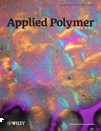
JOURNAL OF APPLIED POLYMER SCIENCE
Connecting Theory with Practice in Polymer ScienceThe Journal of Applied Polymer Science, published by Wiley, is a leading journal in the field of polymer science, showcasing innovative research and applications in various domains since its inception in 1959. With an ISSN of 0021-8995 and an E-ISSN of 1097-4628, it is indexed in prominent databases, maintaining a strong presence with Scopus rankings placing it in the Q2 category across multiple disciplines, including Chemistry, Materials Chemistry, and Polymers and Plastics. The journal’s commitment to advancing scientific knowledge is reflected in its impact on the materials science community, with noteworthy rankings such as #38 in Surfaces, Coatings and Films and #51 in Polymers and Plastics. Though not an open-access publication, it remains a vital resource for researchers, professionals, and students aiming to deepen their understanding of polymer applications and to stay abreast of the latest developments in this ever-evolving field. With a focus on high-quality research, the Journal of Applied Polymer Science continues to be a cornerstone for those engaged in polymer research and its myriad applications.
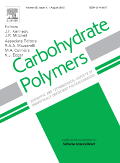
Carbohydrate Polymers
Elevating the standards of materials chemistry.Carbohydrate Polymers is a prestigious academic journal, published by ELSEVIER SCI LTD, that plays a vital role in the field of materials chemistry, organic chemistry, and polymer science. With its Q1 category rankings in these domains, this journal serves as a critical platform for disseminating high-quality research, innovative methodologies, and significant advancements in carbohydrate-based polymers. Since its inception in 1981 and continuing until 2025, it has fostered critical discussions and collaborations among researchers, professionals, and students worldwide. Although it does not offer open access, its rigorous peer-review process ensures that only the most impactful studies are published. By highlighting new developments in the synthesis, characterization, and application of carbohydrate polymers, Carbohydrate Polymers consistently contributes to the enhancement of knowledge and technology within its field, making it an essential resource for anyone working at the intersection of chemistry and materials science.

JOURNAL OF POLYMER SCIENCE
Exploring the Science of Polymers: Where Innovation Meets ApplicationJOURNAL OF POLYMER SCIENCE, published by WILEY, is a premier, open-access journal dedicated to advancing the field of polymer science and its applications. With an ISSN of 2642-4150, it offers a platform for high-quality research and innovative ideas, contributing significantly to the understanding of polymaterials and their functionalities. The journal is recognized for its exceptional impact within various categories, consistently achieving Q1 rankings in Materials Chemistry, Physical and Theoretical Chemistry, and Polymers and Plastics, demonstrating its influential presence in the academic community. As of 2023, it holds a distinguished position in Scopus rankings, underscoring its relevance and rigorous peer-review process. By facilitating open access to vital research findings, the JOURNAL OF POLYMER SCIENCE plays a crucial role in fostering collaboration and knowledge transfer among researchers, professionals, and students, paving the way for innovative developments in polymer applications and materials science.

Polymer Chemistry
Leading the Charge in Polymer Research ExcellencePolymer Chemistry is a premier peer-reviewed journal published by the Royal Society of Chemistry, focusing on cutting-edge research and developments in the field of polymer science. With its ISSN 1759-9954 and E-ISSN 1759-9962, this journal has established a significant impact within the academic community, as evidenced by its impressive Q1 ranking in areas such as Biomedical Engineering, Organic Chemistry, and Polymers and Plastics. Over its convergence period from 2010 to 2024, Polymer Chemistry has become an essential resource for researchers, professionals, and students, showcasing innovative studies that advance the understanding of polymer behavior and applications. The journal does not currently offer open access, allowing for a traditional but rigorous peer-review process ensuring high-quality publications. For those engaged in the rapidly evolving disciplines of biochemistry and bioengineering, Polymer Chemistry serves as a vital platform for disseminating influential findings and fostering interdisciplinary collaboration in a global context.
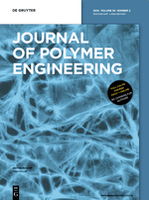
JOURNAL OF POLYMER ENGINEERING
Driving Technological Breakthroughs in Polymers.JOURNAL OF POLYMER ENGINEERING, published by Walter de Gruyter GmbH, stands as a pivotal platform in the field of polymer science and engineering. With an ISSN of 0334-6447 and an E-ISSN of 2191-0340, this journal has been a vital contributor to the academic landscape since its inception, spanning publications from 1981 to 2024. As a recognized entity in the realms of Chemical Engineering, Materials Chemistry, and Polymers and Plastics, it holds a respectable position in Q3 quartile rankings according to the latest assessments. The journal is positioned to promote the exchange of cutting-edge research findings, technological advancements, and critical reviews that address the complexities of polymer application and innovation. Researchers and professionals will find a wealth of information, from experimental methodologies to theoretical analyses, all designed to inspire and elevate the current understanding of polymer engineering. By fostering collaboration and dissemination of knowledge, the JOURNAL OF POLYMER ENGINEERING remains crucial for advancing research and education in its specialized domains.

INTERNATIONAL JOURNAL OF POLYMER ANALYSIS AND CHARACTERIZATION
Advancing the frontiers of polymer science.International Journal of Polymer Analysis and Characterization is a distinguished scholarly publication dedicated to the field of polymer science, with a focus on innovative methodologies and significant advances in the analysis and characterization of polymeric materials. Published by Taylor & Francis Ltd in the United Kingdom, this journal serves as a vital resource for researchers, professionals, and students deeply engaged in Analytical Chemistry, Chemical Engineering, and Polymer Science. With a convergence spanning from 1995 to 2024, it holds a Q3 ranking in the 2023 category quartiles for its valuable contributions to the fields of Analytical Chemistry, Chemical Engineering, and Polymers and Plastics. Despite being a non-open access publication, its rigorous peer-review process and comprehensive coverage of current trends ensure that the journal remains a crucial platform for disseminating impactful research. The journal is indexed in various databases, underscoring its relevance and quality in the academic community. Exploratory studies and articles that push the boundaries of polymer analysis find a welcoming home within these pages, making it an essential read for those aiming to stay at the forefront of polymer research.